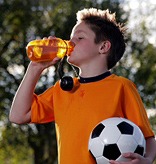
Jun 05, 2013 • 4 min read
Staying Hydrated, Happy and Healthy for the Summer Sports Season
 Did you know that young athletes are at a higher risk for heat-related illnesses than adults? This is because kids don’t sweat as much as and absorb heat faster than adults. Plus, kids tend not to want to drink water or other fluids while they’re exercising. Even though most pediatricians recommend that kids should drink half of their total body weight in ounces of water each day, we all know that, in reality, that is the exception rather than the rule.
Did you know that young athletes are at a higher risk for heat-related illnesses than adults? This is because kids don’t sweat as much as and absorb heat faster than adults. Plus, kids tend not to want to drink water or other fluids while they’re exercising. Even though most pediatricians recommend that kids should drink half of their total body weight in ounces of water each day, we all know that, in reality, that is the exception rather than the rule.
With the summer camp and tournament season fast approaching and temperatures rising just in time for kids to be playing in hot — and often humid — weather all across the country, we are likely to see a rise in the number of heat-related illnesses, including dehydration, heat exhaustion and heat stroke, among young athletes. Making it worse? The proliferation of artificial turf fields, which can be nearly 86 degrees — yes, you read that right — hotter than natural grass fields.
What can you, the team manager, do to keep your team of young athletes hydrated, happy, and healthy through a weekend tournament or week-long camp?
First, make sure your athletes are hydrated before they even step on the field. Experts agree that it’s a good idea to start drinking fluids two hours before physical activity and stop drinking 30 minutes before game or practice time to avoid cramping. In that hour and a half, the typical recommendation is for a young athlete to drink 12 to 16 ounces of fluid. Your best bet for what to drink? Plain old H20.
Second, make sure your young athletes are sipping water throughout the practice or game. This helps ensure that they are replacing the water their young bodies are losing through perspiration during exercise. While adults lose about one liter of water per hour during strenuous exercise (human bodies are 60 percent water), kids lose it at a somewhat slower rate, but that doesn’t mean they don’t need it replaced.
Finally, according to research, the first 20 minutes after the practice or game is the most critical and efficient time to rehydrate. Experts recommend that young athletes drink 20 ounces of fluid in this timeframe. Again, most kids will be fine with water, but some higher-level athletes or kids who have played a particularly long game or match (e.g., longer than 90 minutes) may need a sports drink to replace the electrolytes lost during exercise through perspiration. Another good post-game or practice alternative is low-fat chocolate milk, because it has carbohydrates and natural, healthy proteins that are beneficial for growing bodies.
You should also be aware of the signs of heat-related illness so you can take action immediately. The common signs of dehydration are headache, dizziness, nausea, fatigue and irritability. If an athlete complains of any of these symptoms, hydrate. Sometimes, a young athlete might not tell you she is feeling any of these things, but you just know she doesn’t ‘seem right’. Again, your best bet is to hydrate to avoid serious heat-related illness, and, of course, get the player off the field immediately and let her rest in a cool, shady location. Left untreated, dehydration can develop into more serious cramping, heat exhaustion and a very dangerous condition called heat stroke, which can require hospitalization. Here is a great article from Coach Kurt Simonsen with tips on recognizing and handling heat exhaustion in athletes.
Working with the parents of your young athletes to educate them about the signs of heat-related illnesses — and how to prevent them through effective hydration — should help you keep your team practicing and playing throughout the summer months.
This post was originally published on May 24, 2011 on TeamSnap.
Emily Cohen is a freelance writer living in Berkeley, California. An avid tennis player and swimmer, Emily has a son who plays varsit high school baseball and a daughter who plays Class I soccer and middle school volleyball. She has been a team manager for a number of her children’s sports teams. You can find Emily’s blog about team management and youth sports parenting here at tsblogadmin.wpengine.com. Follow her on Twitter at @emilygcohen or email her at emily@emily-writes.com
